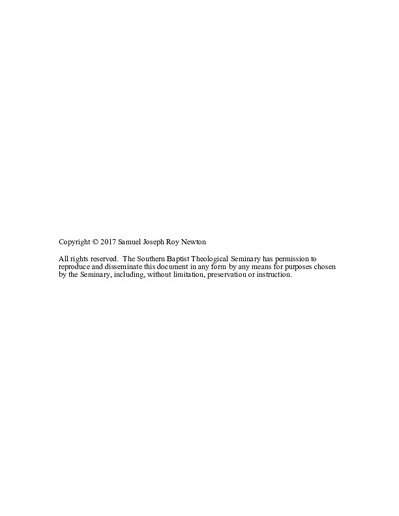| dc.contributor.advisor | Haykin, Michael A. G. | |
| dc.contributor.author | Newton, Samuel Joseph Roy | |
| dc.date.accessioned | 2018-01-02T22:21:26Z | |
| dc.date.available | 2018-01-02T22:21:26Z | |
| dc.date.issued | 2018-01-02 | |
| dc.identifier.uri | http://hdl.handle.net/10392/5464 | |
| dc.description.abstract | The high Christology and unique pneumatology of John’s gospel has often eclipsed the apostle’s teaching on the relationship of the believer to Christ and the Father through the Spirit in Johannine studies. This dissertation seeks to fill this gap by providing an exegetically-focused treatment of sonship in the Johannine corpus that gives special attention to the role of the Spirit in bringing God’s children to participate in the life of the Son and his relationship with the Father. The central thesis is that John, in a manner distinct from Paul’s metaphor of adoption, presents the sonship of believer’s as the result of the Spirit’s work of regeneration out of which flows faith and participation in Christ’s life as Son. At the heart of this study are eight Johannine passages––John 1:12–13; 3:3–8; 14:16–23; 20:17; 1 John 3:1–3, 24; 4:13; and Revelation 21:7––that provide the exegetical lens to view the Spirit of Sonship in John.
Although the exegesis of chapter 3 forms the foundation of study, chapter 2 considers the eight Johannine passages through the eyes of John Calvin and John Gill––both instrumental in advancing the theology of the Spirit and providing an exegetical foundation for their theology. Chapter 4 identifies three primary themes––obedience, love, and life––drawn from the eight passages and briefly synthesizes and correlates these themes with other key texts in the Johannine corpus. A brief survey of literature on sonship is reviewed in chapter 1, setting the landscape to which this dissertation seeks to contribute.
By focusing on the role of the Spirit the persons of the Father and Son are not diminished, but brought into clearer focus, which is consistent with the Spirit’s ministry to glorify the Son (John 16:14). The Father is the divine initiator, the Son the divine accomplisher, and the Spirit the divine mediator of every spiritual reality that is in and through the Son to the believer. At the center of the Spirit of sonship is the glory of the Son who reveals the glory of the Father in the hearts of the children. | en_US |
| dc.subject.lcsh | Bible. John--Criticism, interpretation, etc. | en_US |
| dc.subject.lcsh | Holy Spirit | en_US |
| dc.subject.lcsh | Bible. Epistles of John--Criticism, interpretation, etc. | en_US |
| dc.subject.lcsh | Bible. Revelation--Criticism, interpretation, etc. | en_US |
| dc.title | The Spirit of Sonship in the Johannine Corpus | en_US |
| dc.type | Electronic dissertation | en_US |
| dc.type | Text | en_US |
| dc.publisher.institution | Southern Baptist Theological Seminary | en_US |

